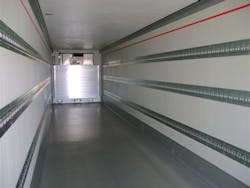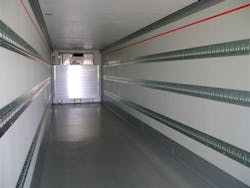What you need to know if your freight is food
Would you feed your family with the food that comes off your trucks?
That’s a question Brett Mowers, transportation manager for River Valley Foods in Syracuse, NY, urges carriers that transport food to ask themselves before delivering a shipment.
Mowers, along with John Ryan of TransCert and the Sanitary Cold Chain, spoke during a recent Fleet Owner webinar on the new food transportation regulations. The webinar was sponsored by Omnitracs, and is now available for those who missed it.
The U.S. Food and Drug Administration finalized a new food safety rule in April to prevent food contamination during transportation. The rule, under the FDA Food Safety Modernization Act (FSMA), requires those involved in transporting human and animal food – shippers, loaders, carriers and receivers – to follow best practices for sanitary transportation, such as properly refrigerating food, adequately cleaning vehicles between loads and properly protecting food during transportation.
Small businesses other than motor carriers that are not also shippers and/or receivers, employ fewer than 500 persons and motor carriers having less than $27.5 million in annual receipts have to comply with the new rules two years after the April 6, 2016, publication of the final rule. Other businesses that are not otherwise excluded from coverage have to comply one year after the publication of the final rule – April 2017.
Changes to the rule include:
* Added transportation operations (cleaning, inspection, maintenance, loading and unloading, and operation)
* Added loaders and unloaders – starting to target the personnel involved
* Flexibility in temperature monitoring (shipper request for continuous monitoring)
* Requirement to take appropriate action in case of adulteration due to equipment failure. That means, Ryan explained, if a reefer fails or containers are compromised and allow contaminants in, it has to be recorded and shown in documentation that action was taken.
* Vehicles and equipment must match needs of transported food
* Shipper reliance on contractual agreements and procedures to assign some of these responsibilities to other parties, if they agree to accept the responsibility. “That agreement between the shipper and carrier has to specify each piece of who’s going to take care of what,” according to Ryan. “Whoever takes responsibility is also responsible for all the data and documentation that goes with it.”
Ryan added that all carriers will be required to train their drivers and transportation personnel on the rules, awareness of potential food safety problems such as cross contamination that may occur during food transportation, and basic sanitary transportation practices to address those potential problems.
He also said carriers must supply a vehicle and transportation equipment that:
- Meets any requirements specified by the shipper
- Appropriate to prevent the food from becoming filthy, putrid, decomposed or otherwise unfit.
- Demonstrate to the shipper and if requested, to the receiver, that it has maintained temperature conditions during the transportation operation consistent with those specified by the shipper.
Ryan mentioned that though the feds will not be ready to begin enforcement by the time the rules are enforced, they are working with many organizations at the federal level – Centers for Disease Control, Homeland Security, Border Control, etc. – and training them to conduct inspections.
River Valley delivers specialty foods, dry foods and refrigerated grocery items to most of the northeast and New England area.
Mowers said the company first heard about FSMA’s new rules two years ago during a national trucking conference. He explained River Valley distributes a line of pickled herring that could kill people if it isn’t shipped properly and emphasized the importance of carriers knowing their products.
“Get yourself informed, subscribe to newsletters and conferences,” Mowers advised. “It makes implementing this a lot easier when you prepare yourself ahead of time. Recall expenses can cost a company millions. If you’re a carrier traced back to a foodborne illness, no one is going to want to use you.”
Mowers suggests fleets:
* Create a food safety team or one person to develop procedures for the company. “Your drivers, your loaders and anybody involved with handling the food, they’re going to be the guys on the front line getting asked these questions and held accountable,” he said. “Get their ideas and get them involved.”
* Consider the appropriate Good Manufacturing Practices (GMP). “Are these standards within your industry? What are we asking our employees to do? How should our processes be completed to be efficient and promote food safety?”
* Create a Food Safety Manual. Start with GMPs and document them, Mowers said. “Ask yourself: ‘What are we transporting here? Can we mix this with other types of freight? Is there a risk of cross-contamination? How will you transport safely for the duration of the trip?’”
Other factors to consider, he added, are site and vehicle security. “Do you know who’s in your building,” he asked. “Someone could walk into your building and tamper with food and raw products. That could get traced back to you if you don’t have proper safety measures in place.”
When it comes to training, Mowers advises that fleet managers link food safety training to all employee orientation programs and keep records of all training. And be sure to follow-up.
“Have scheduled meetings and times to check on your processes,” Mowers urged. “Walk through facility and look at equipment, talk to your drivers, talk to your customers, visit your partners to make sure they’re handling your food in a manner consistent with your safety goals.”
Mowers left fleet managers with two words to think about: preparation and prevention. By starting now, he explained, carriers will solidify themselves for any future inspections.
“By getting out in front of this, this will keep you from losing money, recalls, being put out of service, and you will not be the reason people will get sick or die from foodborne illness,” Mowers said.
About the Author

Cristina Commendatore
Cristina Commendatore is a past FleetOwner editor-in-chief. She wrote for the publication from 2015 to 2023.

